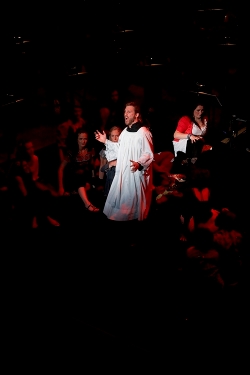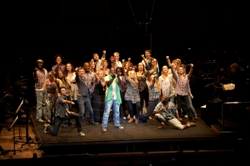The Bernstein Project - Mass, Royal Festival Hall | reviews, news & interviews
The Bernstein Project - Mass, Royal Festival Hall
The Bernstein Project - Mass, Royal Festival Hall
Total artwork, nine months in the making: 500 mostly amateurs rock Lenny's masterpiece
It's been quite a week for youth and the vernacular in the world of so-called “classical” music. Multiply by four the seven fledgling stage animals currently firing up John Adams’s “earthquake-romance” in London's East End, add an orchestra of 13-to-24-year-olds from four continents, student dancers, amateur choirs young and old and just a handful of professionals, and that's only the starting-point for this hair-raising, goosebump-inducing, 500-strong performance of what many of us believe to be Bernstein's most cohesive masterpiece.
The real starting point, in fact, was nine months ago, this being the lynchpin of this season's Bernstein Project, instigated by conductor Marin Alsop and Jude Kelly, artistic director of the Southbank Centre. Only at the weekend did it explode in the hard-won celebration of faith the composer always wanted to be shared by multitudes. And what a piece to introduce schoolkids and teenagers to the awe of a big symphonic piece. For that, despite all the marching bands, electric guitars and pop songs, is exactly what Mass is, taking us from the simplicity of faith through to a more adult view of human suffering with an endless melody that makes you want to weep uncontrollably. "Smiling through tears", Shostakovich's comment on the essence of Jewish folk music, was never more applicable.
As with the Adams piece, there are always going to be uptight folk who resist this naked display of basic emotion; but as with the Stratford East experience, I don't think there were many of those in the packed-out audience. And I ought to make it plain that Bernstein, like Adams, is rigorous about what he takes in his eclectic mix and how he uses it. Disciplined, too, was the lynchpin of the performance, baritone Jesse Blumberg as the Celebrant (pictured below right). He didn't need the microphone, which distorted his more powerful outbursts, though maybe it caught best the soft high falsetto of Bernstein's all-over-the-place vocal writing.
 Which is deliberate, of course, as the priest is the one who breaks down under the questioning of his very diverse congregation. "Fraction", Bernstein calls it, and it's a rare moment of shock when he dashes the communion cup to the ground. The text here, by Stephen Schwartz and Bernstein himself, teeters on the brink of the absurd, but Blumberg pulled off the breakdown so utterly convincingly that the 11-year-old son of a friend of mine asked his father if the man was actually cracking up.
Which is deliberate, of course, as the priest is the one who breaks down under the questioning of his very diverse congregation. "Fraction", Bernstein calls it, and it's a rare moment of shock when he dashes the communion cup to the ground. The text here, by Stephen Schwartz and Bernstein himself, teeters on the brink of the absurd, but Blumberg pulled off the breakdown so utterly convincingly that the 11-year-old son of a friend of mine asked his father if the man was actually cracking up.
How does Bernstein get out of that one? You expect the resolution and the restoration of a wiser kind of faith to be schmaltzy, and it nearly is as the two altar children - Louisa Stuart-Smith and Peter Shafran, outstanding - take up the "Laudates" and inject the whole company with a new sense of fervour. But the song Bernstein pulls off here is a miracle: embracing suffering in its more keening cadences, simple no more but still utterly memorable. I'd stick my neck out and say that it even trumps the "Let us sleep now" reconciliation at the end of Britten's Wilfred Owen settings in his War Requiem - though that's a very different piece, without a touch of Broadway in it. And it does have superior poetry, of course, between the individual responses to the Latin mass - though I'd like to know which four lines Paul Simon is supposed to have contributed here.
I haven't mentioned the context because I think it's less important than the staging and its video projections seemed to think. Bernstein was commissioned to write the piece in 1971 by Jackie Kennedy in memory of JFK. Of course the assassination and the subsequent trajectory both of Vietnam and Martin Luther King all played their part in the work and its questions about leadership as well as faith, but isn't it bigger than that? To be constantly reminded in the images almost prevented it from being about us. Mass, for all its transformation of period popular music, is no more just about America than Weill and Brecht's Rise and Fall of the City of Mahagonny, which its creators wanted to be set in the country, and the language, of the performers. Still, I guess the educational value of teaching the assembled forces about that era of American history must have been important.
Though I've heard sharper edges in previous performances, including Alsop's last ones with the London Symphony Orchestra, there were no weaknesses in any of the ensembles. The ad hoc orchestral ensemble, with its core of players drawn from the National Youth Orchestra and the Youth Orchestra of Bahia, Brazil, produced silky warmth in the deeply serious Meditations, and even if I couldn't quite work out what the dance troupe was trying to convey in these three numbers, they executed their routines with quiet dignity.
 Mary King had trained up the choral cohorts to the right enthusiastic pitch, but it was the team of "Street People" (pictured left) who really took top honours alongside Blumberg's Celebrant. I've only heard the most poignant of the "tropes", "Thank You", more expressively done before, and although I can't single out the individual names who made the biggest impact since they're all mixed up in the cast list, that's not really necessary. As with the Adams piece, it proved that our music theatre courses are now producing more outstanding young performers than will ever get solo jobs in West End shows - a golden age indeed of musical stars who can sing, dance and act. Lenny would have given each and every one of them, and no doubt the remaining 472 performers, a big kiss for proving that his ultimate statement of cautious optimism still has the power nearly 40 years on from its premiere.
Mary King had trained up the choral cohorts to the right enthusiastic pitch, but it was the team of "Street People" (pictured left) who really took top honours alongside Blumberg's Celebrant. I've only heard the most poignant of the "tropes", "Thank You", more expressively done before, and although I can't single out the individual names who made the biggest impact since they're all mixed up in the cast list, that's not really necessary. As with the Adams piece, it proved that our music theatre courses are now producing more outstanding young performers than will ever get solo jobs in West End shows - a golden age indeed of musical stars who can sing, dance and act. Lenny would have given each and every one of them, and no doubt the remaining 472 performers, a big kiss for proving that his ultimate statement of cautious optimism still has the power nearly 40 years on from its premiere.
Share this article
Add comment
The future of Arts Journalism
You can stop theartsdesk.com closing!
We urgently need financing to survive. Our fundraising drive has thus far raised £49,000 but we need to reach £100,000 or we will be forced to close. Please contribute here: https://gofund.me/c3f6033d
And if you can forward this information to anyone who might assist, we’d be grateful.

Subscribe to theartsdesk.com
Thank you for continuing to read our work on theartsdesk.com. For unlimited access to every article in its entirety, including our archive of more than 15,000 pieces, we're asking for £5 per month or £40 per year. We feel it's a very good deal, and hope you do too.
To take a subscription now simply click here.
And if you're looking for that extra gift for a friend or family member, why not treat them to a theartsdesk.com gift subscription?
more Classical music
 Interview: Quinteto Astor Piazzolla on playing in London and why Mick Jagger's a fan
Music Director Julián Vat and pianist Matias Feigin compare notes on Piazzolla
Interview: Quinteto Astor Piazzolla on playing in London and why Mick Jagger's a fan
Music Director Julián Vat and pianist Matias Feigin compare notes on Piazzolla
 Classical CDs: Bells, birdsong and braggadocio
British contemporary music, percussive piano concertos and a talented baritone sings Mozart
Classical CDs: Bells, birdsong and braggadocio
British contemporary music, percussive piano concertos and a talented baritone sings Mozart
 Siglo de Oro, Wigmore Hall review - electronic Lamentations and Trojan tragedy
Committed and intense performance of a newly-commissioned oratorio
Siglo de Oro, Wigmore Hall review - electronic Lamentations and Trojan tragedy
Committed and intense performance of a newly-commissioned oratorio
 Alfred Brendel 1931-2025 - a personal tribute
A master of feeling and intellect
Alfred Brendel 1931-2025 - a personal tribute
A master of feeling and intellect
 Aldeburgh Festival, Weekend 2 review - nine premieres, three young ensembles - and Allan Clayton
A solstice sunrise swim crowned the best of times at this phoenix of a festival
Aldeburgh Festival, Weekend 2 review - nine premieres, three young ensembles - and Allan Clayton
A solstice sunrise swim crowned the best of times at this phoenix of a festival
 RNCM International Diploma Artists, BBC Philharmonic, MediaCity, Salford review - spotting stars of tomorrow
Cream of the graduate crop from Manchester's Music College show what they can do
RNCM International Diploma Artists, BBC Philharmonic, MediaCity, Salford review - spotting stars of tomorrow
Cream of the graduate crop from Manchester's Music College show what they can do
 Classical CDs: Bells, whistles and bowing techniques
A great pianist's early recordings boxed up, plus classical string quartets, French piano trios and a big American symphony
Classical CDs: Bells, whistles and bowing techniques
A great pianist's early recordings boxed up, plus classical string quartets, French piano trios and a big American symphony
 Monteverdi Choir, English Baroque Soloists, Suzuki, St Martin-in-the-Fields review - the perfect temperature for Bach
A dream cantata date for Japanese maestro and local supergroup
Monteverdi Choir, English Baroque Soloists, Suzuki, St Martin-in-the-Fields review - the perfect temperature for Bach
A dream cantata date for Japanese maestro and local supergroup
 Aldeburgh Festival, Weekend 1 review - dance to the music of time
From Chekhovian opera to supernatural ballads, past passions return to life by the sea
Aldeburgh Festival, Weekend 1 review - dance to the music of time
From Chekhovian opera to supernatural ballads, past passions return to life by the sea

Comments
...
...